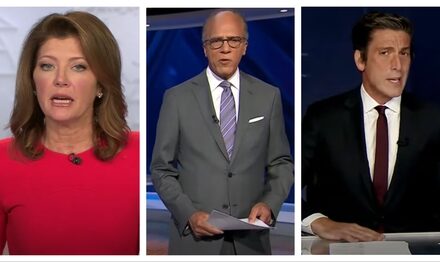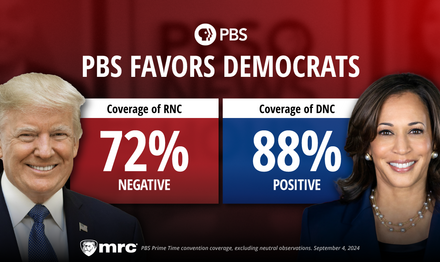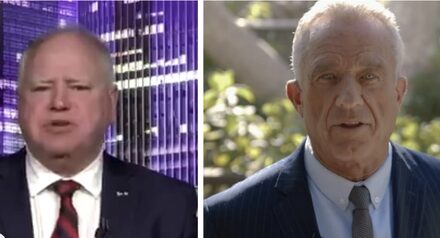We support our Publishers and Content Creators. You can view this story on their website by CLICKING HERE.
Adding to the stakes of who wins in November, the big issue in 2025 will be the expiration of the Tax Cuts and Jobs Act, aka the Trump tax cuts. A look back at the media’s performance seven years ago, as the tax reform package moved through Congress, shows the liberal media’s raging hostility to lower tax rates — and the wrongheadedness of their predictions that lower rates wouldn’t boost economic prosperity.
The Trump tax cuts lowered the effective tax rate for all income groups, and nearly doubled the standard deduction — simplifying the tax returns of most families and a big tax savings for those in the lowest brackets. Yet news watchers heard journalists regurgitate Democratic talking points about how the measure amounted to “stealing” from ordinary workers to benefit the wealthiest Americans.
“Donald Trump ran for president promising to fight for the middle class against the elites…[but] President Trump just released a tax plan that benefits the elites,” MSNBC’s Chris Matthews sneered on September 28, 2017. “He’s the opposite of Robin Hood. He’s the Sheriff of Nottingham!”
“How are you going to make the case that this is not a tax cut for the wealthy?” co-host Charlie Rose grilled Speaker of the House Paul Ryan a few weeks later on CBS This Morning.
On November 13, MSNBC’s Morning Joe brought on liberal economist Jeffrey Sachs to rail about how the tax bill was “theft” by America’s “richest gazillionaires” to “bankrupt” the country. “This is a complete giveaway to the richest people in this country at the expense of everybody else,” he complained. “It’s the biggest theft I’ve ever seen even proposed. It may be the biggest heist in history.”
“Corporate taxes, along with those on wealthy Americans, would be slashed on the presumption that when people in penthouses get relief, the benefits flow down to basement tenements,” the New York Times scoffed in a November 30 front-page “news” story by Peter Goodman and Patricia Cohen.
“I think it’s becoming clear that [the tax bill] is very much tilted toward corporations and the wealthiest Americans,” CBS’s Jill Schlesinger echoed on December 4.
“It’s a terrible idea,” Philadelphia columnist Will Bunch wrote on December 17, “arguably, if approved, the worst law to be enacted on Capitol Hill since the Fugitive Slave Act of 1850, which allowed the return of captured slaves up North to their whip-cracking masters down South.”
“This is a nightmare bill,” liberal economist and New York Times columnist Paul Krugman growled on ABC’s This Week that same morning.
“They are essentially stealing from the rest of us,” New York Times columnist Michelle Goldberg charged on MSNBC’s All In. “The extent of actual kind of straight-up self-dealing in this bill…is really something new and astonishing and sort of more, I think, in common with a post-Soviet kleptocracy than what we’re used to seeing in American politics.”
“It’s the largest transplant of money in the history of the Republic: Trillions of dollars being shoved up to the top to join where most of the money already sits,” MSNBC’s Chris Matthews griped after Trump signed the bill into law on December 20.
Referring to the large collection of GOP legislators at the White House for the bill signing, the Washington Post’s Ruth Marcus mocked: “Nothing brings the Republican Party together like a nice, big irresponsible tax cut, I guess.”
Liberal-minded journalists could not believe that businesses would apply their tax savings in ways that would benefit their employees, customers and shareholders across society. Before the bill passed, MSNBC’s Andrea Mitchell on December 19 reprimanded at a pro-tax cut guest: “I would just argue with you, increase in economic activity because I think that is notional, but it has never proved to be the fact. I mean, this just does not happen.”
“The Republicans are betting if you give corporations a break, they will then hire more people, give them higher wages, build factories. But that’s a big bet,” cautioned NBC’s business correspondent Stephanie Ruhle that morning on Today.
The next day, Today’s Savannah Guthrie confronted Paul Ryan: “As I understand your argument, and that of your colleagues, you’re counting on corporations to take that money they now have and plow it right back into the economy, hire people, raise wages….Are you living in a fantasy world?”
A front-page piece in the December 21 New York Times agreed: “If they [Republicans] are proved correct, they will be repudiating not only historical experience, but most experts. From Congress’s own prognosticators to Wall Street’s virtuosos, scarcely any independent analyses project anything like the rosy forecasts offered by the President’s top economic advisers.”
But just hours after the legislation passed, businesses began announcing wage increases and fat bonuses for workers. NBC’s Ruhle refused to concede she had been wrong: “They’re literally doing the least they can do….This is a great gesture on the part of these companies, but thus far, it’s a gesture.”
By January, the wave of companies boosting workers’ pay was too huge to ignore. “Today Walmart, the nation’s largest private employer, announced plans to raise wages, hand out bonuses and increase benefits,” Nightly News anchor Lester Holt announced on January 11.
At that early point (early January 2018), a list compiled by Americans for Tax Reform showed more than 100 companies had handed out either bonuses or raised worker pay, amounting to thousands of dollars in additional annual income for employees. By June 2024, ATR’s list had grown to “1,233 examples of pay raises, new job creation, facility and product line expansions, special bonuses, utility rate reductions, 401(k) match increases and employee benefit increases attributed to the Tax Cuts and Jobs Act.”
Those are anecdotes, but you can also see the benefits in the government’s own data: In 2018, the post-tax cut economy added 2.7 million jobs; in 2019, another 2.1 million. Earnings were up, too: 3.4% in 2018 and 2.0% in 2019. In both years, the rise in take-home pay was significantly higher than the inflation rate, so these wage gains were real increases in workers’ standard of living.
Thanks to the burst of new economic activity, government revenues didn’t suffer, as most in the liberal media had predicted. According to Congressional Budget Office data compiled by the Cato Institute’s Chris Edwards, total federal tax revenues were $3.32 trillion in 2017 before the Trump tax cuts. Even with the new lower rates, revenue was just as high in 2018 ($3.33 trillion), and continued to rise in 2019 ($3.46 trillion) and 2020 ($3.42 trillion). By the time Joe Biden took office in 2021, tax revenues were over $4 trillion, “22 percent higher than prior to the tax cut in 2017.”
The government also took in even more corporate tax revenue than it would have without the tax cuts. In June 2017, when the higher rates were in place, the CBO estimated the federal government would take in $389 billion in corporate taxes in 2022 and $395 billion in 2023 (scroll to page 17). In fact, the government reaped $425 billion in 2022 and $420 billion last year — billions more dollars flowing into the U.S. Treasury than was expected when the rate was far higher.
In 2017, the media trashed the Trump tax cuts as a gift to the rich that would come at the expense of workers. The experience of the past seven years has shown those predictions to be false. Keep that in mind as you listen to journalists talk about the likely effects of Trump’s promise to cut taxes further if he’s elected next year, or Kamala Harris’s plan to raise them.
For more examples from our flashback series, which we call the NewsBusters Time Machine, go here.

 Conservative
Conservative  Search
Search Trending
Trending Current News
Current News 





